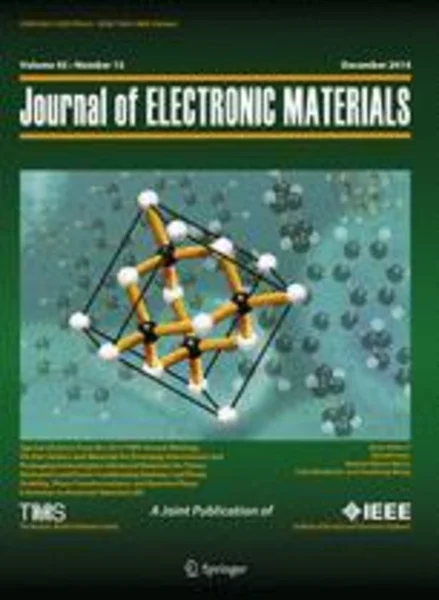-
effects of ni, pd, and pt substitutions on thermoelectric properties of cosi alloys
جزئیات بیشتر مقاله- تاریخ ارائه: 1392/07/24
- تاریخ انتشار در تی پی بین: 1392/07/24
- تعداد بازدید: 1108
- تعداد پرسش و پاسخ ها: 0
- شماره تماس دبیرخانه رویداد: -
ni-, pd-, and pt-substituted cosi samples have been prepared by an arc melting and annealing procedure. the x-ray diffraction and scanning electron microscopy results show that ni and pd are effective n-type dopants for cosi, while pt is immiscible with cosi and forms an impurity phase with a possible chemical formula of ptcosi2. the thermoelectric properties were measured from 80 k to 300 k. for ni- and pd-doped samples, the electrical resistivity and seebeck coefficient decrease simultaneously due to the increasing carrier concentration. for pt-substituted samples, the electrical resistivity also decreases. however, this reduction is thought to be not due to an increase in carriers but rather to originate from the effect of the pt-rich impurity phase at the grain boundaries. the seebeck coefficient is not affected by 1% pt substitution; however, further increase of the pt level also causes a decrease in the seebeck coefficient. the room-temperature power factor is 63 μw k−2 cm−1 for pure cosi and 73 μw k−2 cm−1 for the co0.99pt0.01si sample. although the thermal conductivity is reduced for both n-type-doped and pt-substituted samples around 80 k, the room-temperature values are still close to that of pure cosi. as a result, zt of 0.13 is obtained at room temperature for co0.99pt0.01si, an 18% increase compared with cosi.
مقالات جدیدترین رویدادها
-
استفاده از تحلیل اهمیت-عملکرد در ارائه الگوی مدیریت خلاقیت سازمانی و ارائه راهکار جهت بهبود
-
بررسی تاثیر ارزش وجوه نقد مازاد بر ساختار سرمایه شرکت های پذیرفته شده در بورس اوراق بهادار تهران
-
بررسی تأثیر سطح افشای ریسک بر قرارداد بدهی شرکت های پذیرفته شده در بورس اوراق بهادار تهران
-
بررسی تأثیر رتبه بندی اعتباری مبتنی بر مدل امتیاز بازار نوظهور بر نقد شوندگی سهام با تأکید بر خصوصی سازی شرکت ها
-
تأثیر آمیخته بازاریابی پوشاک ایرانی بر تصویر ذهنی مشتری پوشاک ایرانی (هاکوپیان)
-
بررسی اثر پارامترهای سطوح مشترک بر رفتار دیوارهای حایل سنگ چین با استفاده از روش اجزا منفصل
-
اثرات کوتاه و طولانی مدت عصاره پرسیاوشان روی هموگلوبین، هماتوکریت، حجم گلبول های قرمز، زمان پروترومبین و زمان ترومبوپلاستین
-
بررسی جهش هاى نادر ژن بتاگلوبین در شمال غرب کشور
-
simulation of polycrystal deformation with grain and grain boundary effects
-
determination of mechanical properties of soft tissue scaffolds by atomic force microscopy nanoindentation
مقالات جدیدترین ژورنال ها
-
مدیریت و بررسی افسردگی دانش آموزان دختر مقطع متوسطه دوم در دروان کرونا در شهرستان دزفول
-
مدیریت و بررسی خرد سیاسی در اندیشه ی فردوسی در ادب ایران
-
واکاوی و مدیریت توصیفی قلمدان(جاکلیدی)ضریح در موزه آستان قدس رضوی
-
بررسی تاثیر خلاقیت، دانش و انگیزه کارکنان بر پیشنهادات نوآورانه کارکنان ( مورد مطالعه: هتل های 3 و 4 ستاره استان کرمان)
-
بررسی تاثیر کیفیت سیستم های اطلاعاتی بر تصمیم گیری موفق در شرکتهای تولیدی استان اصفهان (مورد مطالعه: مدیران شرکتهای تولیدی استان اصفهان)
-
نقش حسابداری مدیریت استراتژیک در عملکرد سازمانی (مطالعه موردی : هتل های 5 ستاره شهر تهران)
-
طراحی الگوی سقف شیشه ای با رویکرد نظریه داده بنیاد
-
بررسی عوامل موثر مدل سازی فرآیندهای کسب و کار(bpm) در قالب چارچوب itil جهت ارتقای هوش تجاری (bi) در سازمان تامین اجتماعی تهران
-
نقش ویژگی های کمیته حسابرسی بر رابطه بین انطباق مالیاتی و هموارسازی سود
-
بررسی ارتباط بین ضعف کنترل های داخلی و همزمانی قیمت سهام در شرکت های پذیرفته شده در بورس اوراق بهادار تهران: تبیین نقش تعدیلگر ویژگی های هیئت مدیره




سوال خود را در مورد این مقاله مطرح نمایید :